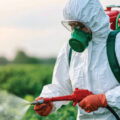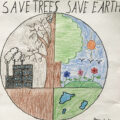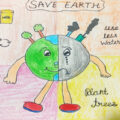
June 01, 2021
4-year-old Maya Shah asks
Why can’t I meet Nani?
Since the second wave of coronavirus is highly infectious, we have to protect our elders the most. So not meeting your Nani or any other relative is actually the best way to say you love them. Remember, if we stay distant for just a little while, we can all be together again.
Will I never go to school again? Is school a bad place?
School is a fun place, really! And yes, it’s so sad that you are missing out on all the fun times like playing with your friends, learning together in a classroom and doing activities with a teacher guiding you. It’s only a matter of time before things open up and you’ll be able to enjoy school again.

If my parents are isolating, will they ever come out?
Your parents are isolating or in quarantine because they have this super infectious virus; and they are protecting you and those who don’t have the virus. But this is only for 10 to 14 days. You can video call your mother or father from the next room. You can also watch movies or play games together through the internet.
Is the world going to end?
No, absolutely not. We have very brave soldiers like our doctors, scientists and governments, who are working really hard to keep an eye on the sick. What is important is that you keep doing what you love to do and not worry about the virus. If you are following COVID-appropriate behaviour, which means you are masking, distancing and sanitising, you will defeat the virus!
Parent Disha Makharia’s 3-year-old asks
I feel scared of all the things I used to love earlier, such as swimming, meeting friends and birthdays. What do I do?
It’s natural to have this fear because we all are afraid of getting infected. Some of the activities you used to love doing can still be done, but with a few precautions. For example, you can play within your building compound but with your mask on as long as you keep your distance from other kids. Once things open up, you can enjoy many more activities. However, for now, maintain social distance, wear a mask outdoors at all times and use a sanitiser frequently.

Parent Divya Saraf’s 3-year-old asks
Why can’t my friend, who is on a quarantined floor, come to play with me?
Your friend probably has a family member or neighbour who has been detected COVID positive. Government rules prescribe that the floor of an infected patient be quarantined to prevent the spread of the virus. Quarantine means that people cannot leave their homes and no one can visit them. Your friend is being a super friend by staying isolated and making sure the people around her are safe.
Dr Priti Jain’s 10-year-old asks
Why can’t my mom be at home with me?
It’s normal for you to feel this way because many of your friends might have their parents around them during the lockdown. But your mother is playing a very important role in treating people who are sick. You can spend your evenings and her days off with her and be proud of everything she is doing for the country.
5-year-old Arya Sethi asks
Will Skittle, my cat, get coronavirus?
So far, it has not been common for animals to get COVID and they don’t spread it either. So please go ahead and love and feed your pets just as you did before. They are not a danger to you or others.

Why is my mom negative while dad, Nani and I are positive?
Sometimes, in a single family, only one person could be negative. We really don’t know why this happens. But if your mother is negative and the rest of you are positive, it’s important that the three of you isolate yourselves from her. This way, she can stay safe and also take care of you.
Why did coronavirus suddenly appear? Where was it before this?
Coronaviruses are actually a family of viruses, some of which are seen during the winter months even in normal times. A type of coronavirus called SARS (Severe Acute Respiratory Syndrome) was seen in 2003. But the spread of this virus was controlled by taking the right steps. The COVID-19 virus is a new virus detected in 2019. This too will be controlled in the time to come.
Will I ever be able to meet my friends and go to school, dance class and gymnastics class again?
Yes, you will. And this is because scientists have developed, and will continue to develop, vaccines that can prevent people from getting sick. Once all children get vaccinated, many of the things you can’t do right now will be allowed.
10-year-old Rovin asks
My friends are being mean to me because my dad has COVID symptoms and his test results are pending. What should I do? That’s really sad. Coronavirus is infectious for sure, but some people unfairly blame those who get infected with COVID-19 because they do not have proper knowledge about how COVID-19 spreads. With such friends, you can tell them, “My dad has COVID but we are doing the best we can to follow all the norms so that you can also stay safe.” If they continue to be mean, ignore such friends.
8-year-old Luca Downer asks
What happens if both my parents get COVID?
So here are some things you can do right now if you and your parents stay alone. Ask your mother and father to give you the numbers of trusted adults in your neighbourhood or relatives who can look after you and assist you for a few days. You should also know your home address. Ask your parents to speak to these people in advance in case they get sick.
What foods should I eat to avoid COVID?
COVID-19 spreads mainly from person to person through respiratory droplets from an infected person’s cough or sneeze. These droplets can land in the mouth or nose of people who are nearby or possibly be inhaled into the lungs. To keep your immunity high, you need to eat a lot of immunity-building foods and foods that are rich in vitamin C. Also always eat freshly prepared food and fruits that have been properly washed. It is a good idea to eat hot food and stop drinking cold water or eating cold things as the virus tends to attack the nose and throat first.

Parent Akanksha Puri asks
We recently lost my aunt to COVID. My daughter asked if we would donate her organs and if not, why?
People infected with COVID-19 are not considered for organ donation. This is because the risk of getting COVID-19 from an infected organ donor is still not fully known.
10-year-old Trishir Dhawan asks
Who will be infected and part of the death toll in the third wave?
Any epidemic usually makes its impact in three waves, and usually, the second one is most severe. It is likely that we might experience a third wave, and children and those who haven’t received the vaccine will be exposed. Many countries have already approved vaccines for children, and our country will also do the same soon. The intensity of the third wave is going to depend on the proportion of vaccinated people and whether we can avoid crowding and large gatherings.
9-year-old Kanishka asks
When will the COVID-19 pandemic end?
For the pandemic to slow down, and for life to become somewhat normal, we have to work alongside doctors, the government and experts who are doing their job by getting us medical care, developing vaccines and conducting research. We need to do our bit by following COVID-appropriate behaviour and staying at home as much as possible. The more we do this, the faster things will become normal again.
Parent Jassi Singh asks
When I say corona is outside, my daughter says show me. How can I help her understand the virus?
The average size of a human virus is about 100 nanometres, which is 0.00001cm (ten-thousandth of a centimetre). So, you can imagine how tiny the coronavirus is. It can only be seen under a very powerful microscope. But scientists who have studied it say it looks like a colourful spiky fuzzball. Because the virus is so tiny, it is called an “invisible enemy”.
Yesterday my daughter was praying to god saying, “Please god, take corona away, I want to go out and play.” I felt helpless. Is there anything I can do?
It’s totally normal to feel helpless. After all, for a little child, playing is a big part of growing up, and as parents, we do wonder if our child is being deprived of a normal childhood. So here are some things that might help you. Whatever we know from previous world crises such as wars and natural disasters indicates that children are extremely resilient. Having a calm, understanding and caring parent or caregiver is all they need to overcome anything difficult. Their distress is very normal, but if they quietly accept the situation, we should be worried!
One question my daughter asks me 100 times a day is, “When can I step out of the house?” What can I tell her?
During a time of crisis like this, perhaps the most compassionate thing we can do for our children is to firmly set limits about leaving the house and following all the protocols. Keep the long-term picture in mind, which is ensuring your child is healthy—both physically and emotionally. But this is easier said than done. So in the process of taking care of your child, don’t forget your own self-care. Children learn from watching so lead by example. Follow the norms, don’t leave the house unless it’s essential, take care of your diet and sleep and handle things calmly. Your child will follow your lead.
REFLECTION: Pandemic Pressures
Write a short note on how the pandemic has affected you.






























